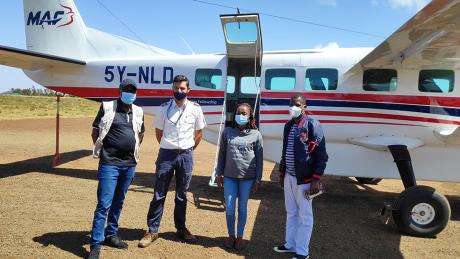
Kenyan Pastor Purity Murungi, of CITAM (Christ is the Answer Ministries), joined an MAF flight earlier in the year to visit the church’s projects in the north and welcome new missionaries. Purity shares about current ministries and future hopes to reach further with the help of MAF
Ministry in northern Kenya
‘We have seven mission stations in the north. Three in Marsabit town, one in Archers Post, and others in Kargi, Olturot and Loiyangalani. There is quite some work going on up there amongst different people groups which include the Rendille, the Turkana, the Samburu, the Borana, the Gabra and the Burji as well.
‘The majority of these people are from African traditional religions background where they worship the spirits and ancestors.
‘When the New Testament Bible in Rendille was launched recently in Marsabit, we had a big celebration! The translation was completed by BTL – Bible Translation Literacy - who do translation for all the local dialects. It is very difficult to translate into the Rendille language. It has taken years and there were many challenges. Some of the names that they use for things do not appear in the English version. There are some animals that are not mentioned in their context. It’s quite a tedious job to get the message across in the original context. The completed translation is such a milestone.’
There are so many ways to reach people
Empowerment and sustainability
‘At CITAM we have a generational model of impact, which empowers communities and is sustainable. We are asking the question, ‘What is our legacy? What do we want to be remembered for a hundred years from now?’ Of course, our core business is evangelism and discipleship. But the best way to reach people is through holistic mission. Actually, there is no other way!
‘Earlier in the year I travelled with MAF to oversee some of the projects we have in the north. We were starting some new projects and evaluating others to see where we could make some improvements.’
Agricultural initiatives
‘We’re introducing agriculture and agribusiness through the missionaries in Olturot. Farming is very foreign in some of the places in the north, so we’re looking at the pieces of land that the community has allocated to us to see how we can make best use of them for agriculture. In Olturot, we’ve been growing all sorts of things including watermelon. We partner with an organisation that has supplied solar panels for a water project we’re doing with the community. We are hoping to put up a bore hole so the missionaries can grow fruit and vegetables which are very foreign to the local population. It would give them access to a more varied diet.
‘Across all of our stations, we have a livestock restocking programme funded by the humanitarian agency of the Pentecostal Assemblies of Canada, ERDO which stands for Emergency Relief & Development Overseas. We are partnering with them to deliver goats to households which the people are then able to breed. The people are empowered economically and also have milk for their babies and young ones.’
Empowerment, exports and education
‘There are so many ways to reach people. We are looking into doing projects in sanitation and health, and financial empowerment, [and considering the idea of] putting up mills where the women can grind their maize. We also want to start digging boreholes to provide clean water. In one of our stations we have a bead project, where the women are doing beadwork to make jewelry which we export to provide an income. In that way we are able to empower the women and young mothers so they can take their children to school.
‘CITAM is very keen on education and partner with Missions of Hope International (MOHI) to provide quality education in these remote communities. We are also collaborating with MOHI to deliver leadership empowerment programmes where we put children from the community through education. Some of them go on to do theological training. In the long term, we want the locals, the indigenous person from that area to be able to take over the mission work to reach out to their own communities.
‘The Borana mission outpost is headed by one of the pastors that we have educated from high-school. He’s been in the field for at least eleven years now. So we already have the first fruits. We have others that have completed their training in the last three years.’
MAF has facilitated heaps of ministry, saving us the time spent on the road.
Partnership with MAF
‘We like working with MAF because we have the same values, you’ve been very kind to us and given us subsidies in the past. We have a very busy office and when we travel to support our missions it is very hard for us to compress the work within those days. The roads are not very good in some areas. So MAF has come in very handy in facilitating heaps of ministry, saving us the time spent on the road. We are able to access our missionaries and they feel encouraged because we can meet with them.
‘We are planning a leadership exposure trip to the mission stations in the north for our elders and new deacons, and board members who have not seen our mission work first-hand.
‘We would also like to host vet camps and medical camps to reach out to remote communities. We have all the skills and resources we need in our congregations. People that are willing to go - but not willing to spend all their life on the road. If MAF could help us fly from one station to the next station we could achieve a lot. You can do a lot in 24 hours if you have those professional skills.’